The only death row inmate in America who is begging to die is finally given execution date
A quadruple murderer who repeatedly asked for his death is finally executed after 25 years on death row.
Joseph Corcoran, 49, murdered his brother James and three other men in Fort Wayne, Indiana, in July 1997 and was sentenced to death after a trial in 1999.
The then 22-year-old lived in a house with his brother, his sister Kelly and her fiancé Robert Turner at the time of the murders.
He claimed he heard his brother, brother-in-law, Timothy Bricker and Doug Stillwell talk about him while he was upstairs.
Furious, he armed himself with a Ruger Mini-14 assault rifle and stormed down, opening fire on the unsuspecting group, killing them in six seconds.
Last month, the Indiana Supreme Court announced that he would be killed by lethal injection on December 18.
While his lawyers continue to fight on his behalf, claiming he is too mentally ill to execute, Corcoran has previously said he wants to die.
Joseph Corcoran, 49, killed his brother James and three other men in Fort Wayne in July 1997 and has been on death row since his 1999 trial
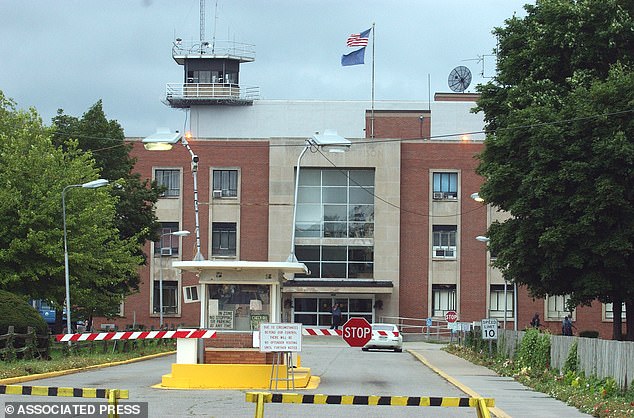
Corcoran’s federal appeals ended in 2016. He is currently being held at the Indiana State Prison in Michigan City, seen here
In 2006, he wrote to a Fort Wayne newspaper, saying, “I believe the death penalty is a just punishment for murder. I am guilty of murder, therefore I must be executed.”
He continued, “Why would you give someone like that life in prison? If they kill someone, they’ve won the lottery; they receive free room and board for the rest of their lives.
“That is why I believe that the death penalty is a just punishment for murder.” he added.
Corcoran also attempted to have his right to appeal the death penalty removed at the time of his sentencing.
Addressing the court, he said: ‘Do I have the right to withdraw from my appeal? I wish to renounce my profession.’
He was found to be suffering from paranoid schizophrenia after being imprisoned for the murders.
In a July lawsuit before the Indiana Supreme Court, it was revealed that Corcoran has the illusion that prison guards are torturing him with an ultrasound machine on a daily basis.
It also said that he has conversations with people who are not there, and that he suffers from an involuntary speech disorder.
He also believes that his thoughts are broadcast throughout the prison and that he says embarrassing things that cause people to act hostile towards him in his sleep.
Citing the opinions of medical professionals, his lawyers have tried to argue that his mental health problems prompted his desire to die.
Clinical psychologist Dr. Robert Kaplan previously testified at a post-conviction hearing that he had no authority to waive his appeal.
Kaplan noted, “One of the reasons he wants to die is because he doesn’t want to continue to suffer from this speech disorder that he doesn’t really have.
‘Another reason he wants to die is because he doesn’t want to remain a victim of the guards’ ultrasound machine. And that is a most bizarre belief.’
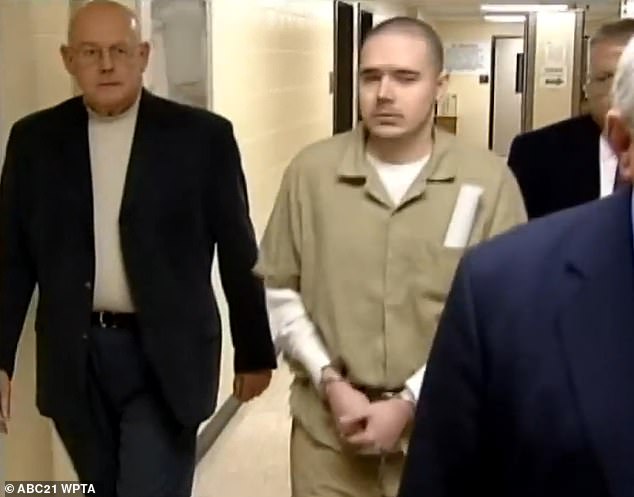
In a July lawsuit before the Indiana Supreme Court, it was revealed that Corcoran has the illusion that prison guards are torturing him with an ultrasound machine on a daily basis.
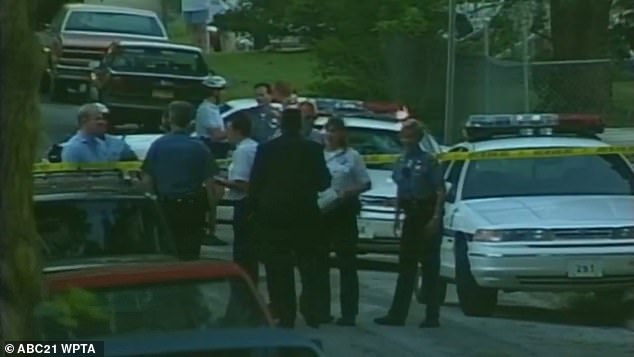
After the quadruple murders, he put down his gun and showed up at a neighbor’s house, asking them to call the police.
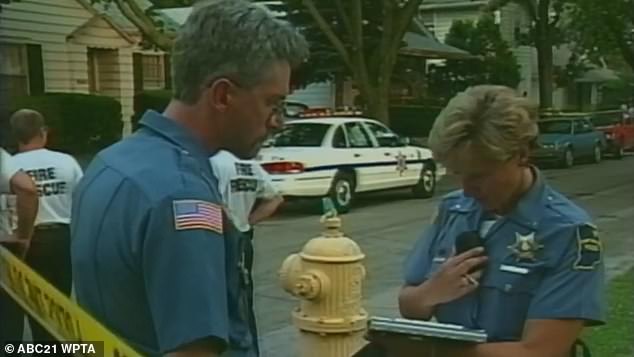
In 1992, he was acquitted of murdering his parents earlier that year in their Steuben County home. Jack and Kathryn Corcoran had been killed by gunfire
At the time of the murders, Corcoran told his niece to stay in her room, loaded his assault rifle with 28 high-velocity bullets and went downstairs.
Within six seconds he had shot his brother three times, Bricker twice and put four bullets in Turner.
The men were all killed instantly. Stillwell shot from the couch into the kitchen where Corcoran gave chase before shooting him four times.
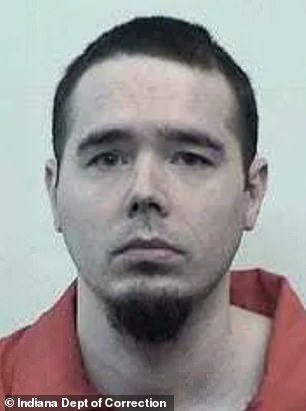
Corcoran loaded his assault rifle with 28 high-velocity bullets and headed downstairs, opening fire on the group
After the quadruple murder, he put down his gun and showed up at a neighbor’s house, asking them to call the police.
A search of his room and secure attic turned up more than 30 firearms, ammunition, explosives, military guides to guerrilla tactics and a copy of The Turner Diaries.
The Turner Diaries is an infamous book written by neo-Nazi William Luther Pierce about a race war within the US.
The book is described by the FBI as the “bible of the racist right” and has inspired attacks such as the 1995 Oklahoma City bombing.
Corcoran would later explain that he was under stress due to his sister’s upcoming wedding, which meant he had to leave the house.
He told officers his real intention was to intimidate the group, saying, “It just didn’t happen that way.”
He raised an insanity defense based on his self-diagnosis that he had a paranoid or schizotypal personality disorder.
Court-ordered psychiatrists who evaluated him later concluded he was competent to stand trial.
Earlier in 1992, he had been acquitted of murdering his parents in their Steuben County home. Jack and Kathryn Corcoran had been killed by gunfire.
The Steuben County trial heard testimony that he was involved in weapons and murder, and that he allegedly offered people money to kill his parents.
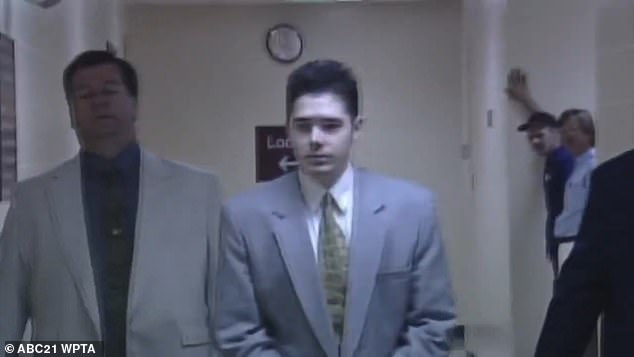
Corcoran raised an insanity defense based on his self-diagnosis that he had a paranoid or schizotypal personality disorder.
This is evident from a local newspaper article seen by at the time WANthe police thought he killed his parents with a size 12 and then got on the bus to school.
Prosecutors in the case argued that he killed his parents after they sold a car he thought would go to him, burned his music tapes and forced him to attend church.
The investigation into their deaths continues, but is at a standstill.
Officials with the Steuben County Sheriff’s Department told the station that the acquittal remained open, but there were no active leads.
After the death of her brother James, Corcoran’s sister Kelly told reporters, “I knew at that moment that he had killed my parents.”
She continued; ‘I cried so many tears. I’m dry, everything is gone. He ruined my life.’
Despite his lawyers claiming that by executing Corcoran the state would violate his Eighth Amendment, they are going ahead with it.
The order read: “It is ordered that the execution of the sentence of death imposed on Joseph E. Corcoran shall be carried out on December 18, 2024 before the hour of sunrise.”
Corcoran’s federal appeals ended in 2016. He is currently being held at the Indiana State Prison in Michigan City.
His lead attorney Larry Komp told the Indiana Capital Chronicle that they would be seeking a last-minute pardon.
Corcoran’s execution will be the first in the state since 2009, according to the Death Penalty Information Center.
The last death penalty carried out was against Matthew Eric Wrinkles, who was murdered for the triple murder of his wife, her brother and sister-in-law.
The hiatus of more than a decade has been attributed to the unavailability of lethal injection drugs.
Earlier this year, the Department of Corrections announced that after “years of effort,” they had obtained the narcotic Pentobarbital.

Use of the drug has never been used in Indiana before, but Gov. Eric Holcomb, seen here, said he felt “comfortable” with the option
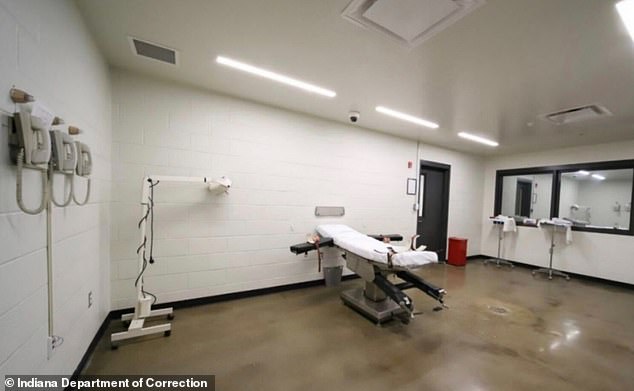
His execution will be the first in the state since 2009, according to the Death Penalty Information Center
Use of the drug has never been used in Indiana before, but Gov. Eric Holcomb said he felt “comfortable” with the option.
Since the state announced that they had managed to obtain the drug despite a shortage, they have been tight-lipped about how they got their hands on it.
The Department of Corrections has consistently denied requests for information.
Holcomb said, “We have done our due diligence and we have followed this particular drug, and we feel comfortable that not only is it the right drug, but that the protocol is in place and that we are prepared to continue our mission to carry out. duties.
“We’ve been working on this for seven years, and I would say, through no fault of anyone, it’s harder to come by for a variety of reasons.
“When such evil is shown, I personally believe in it. I respect others who don’t. The will of the people will be carried out, and that is the law of our land.”
The state currently has eight people on death row, according to the Death Penalty Information Center.
Some states have been looking for new ways to execute prisoners after drugs used in lethal injections became increasingly difficult to find. Alabama became the first state to use nitrogen gas in an execution earlier this year.
